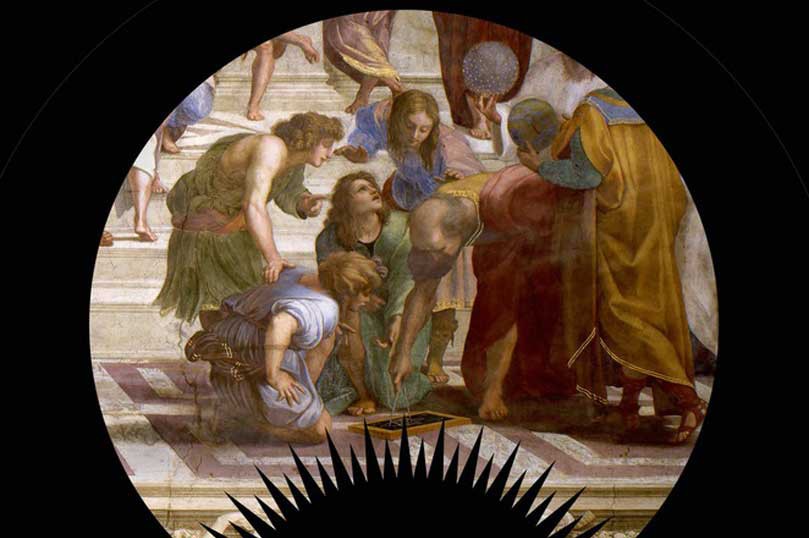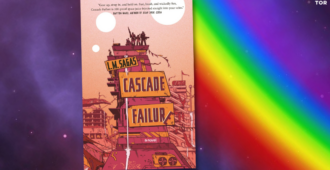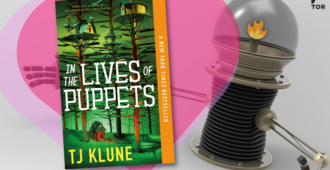
By Jo Walton
One of the odd things about explaining what The Just City is about is people’s reactions. The Just City is a fantasy novel about a group of classicists and philosophers from across all of time setting up Plato’s Republic on Atlantis, with the help of some Greek gods, ten thousand Greek-speaking ten-year-olds they bought in the slave markets of antiquity, and some construction robots from our near future. What could possibly go wrong?
Now I get two different immediate reactions to this. The first is from people who say “That’s insane, and I want it now!” The second is from people who say they know nothing about Plato or philosophy in a kind of apologetic way, as if anything that touches on these subjects in any way would require background reading and be kind of boring. When I said I’d written a book (Among Others) about growing up in South Wales and going to boarding school in England, with fairies, absolutely nobody said “I don’t know anything about South Wales” (or fairies, or boarding school) and I don’t think it’s because they had any more background knowledge of those things, I think it’s because there’s an odd kind of cringe before things that are “high culture” and which, without knowing anything about them, many people think are superior and many people secretly think are boring. And lots of people haven’t read Plato—which seems weird to me as I have been reading Plato since I was a kid (which is why I don’t share that cultural cringe) and totally immersed in Plato for the last eighteen months. But there are lots of things I am like that about. Proust, for example. Everyone says how great Proust is, but nobody says it is fun, and I’ve never even tried to read Proust, and even now thinking about it, I shrink away a little bit and think I’d be bored.
So if Plato is, for you, what Proust is for me, first, I think Plato is fun and readable and a weird mixture of brilliantly insightful and totally insane. And The Republic is supposedly a blueprint for a utopia, but it’s really apparent to anyone reading it that it would not work in practice because human nature. And yet… Plato wrote about gender equality two thousand and four hundred years ago. He wrote about striving for excellence, and justice. And The Republic is weirdly specific about some things and just as weirdly vague about others. For the characters caught up in it, it starts to seem completely normal, but a large part of philosophy is of course about questioning everything.
What I’ve written in The Just City is a utopia. No, a dystopia. No, wait, no… no, it’s not an ambiguous heterotopia either. But it’s about a designed society, and about human nature, and consent, and questioning. It’s about two women (and one god) growing up.
I had a lot of fun writing it, and I hope you’ll have fun reading it.
…………………………
From the Tor/Forge January newsletter. Sign up to receive our newsletter via email.
…………………………
More from the January Tor/Forge newsletter:
- Three Ekprhastic Dialogues; or NO DUAL WIELDING UNTIL BOOK THREE by Brian Staveley
- Knee Deep in Mud for Art’s Sake by Greg van Eekhout







I’m in the “that’s insane and I want it now” Category. I am sad TOR did not send me a review copy, but release day is nigh!
He also wrote about a caste system, government censorship, and a life of complete devotion to the state. Even if it COULD work, I wouldn’t want to live there.
To be fair to Plato: the caste system is set up as the only way of even hoping to get intelligent and incorruptible rulers – and he makes it very clear that even that won’t work for ever, or even for very long. So if the only people we could trust to rule us are those bred, trained and tested from birth to serve the interests of the people they govern, and we have no hope of creating such a system (pace Doc Smith’s Lensmen!), and even less hope that the system would itself be immune to decay, then presumably the moral is that we can’t trust anyone at all to rule us (not even us!).
Sounds fantastic! I will pay money for this! 😀
Stephen: note that the Lensmen are the policemen/military of the galaxy, not the rulers. Smith said little about their training, but somewhere they learned things the shoguns didn’t about subordination of the military to civilian rule. They were also chosen by beings who were what gods ought to be, which handwaves the whole question of a small group picking which of their peers shall rule.
I wonder if Walton knows Richard Ashby’s “Commencement Night” (reprinted in Spectrum 5, so it might have been findable). AFAICT it’s the granddaddy of the remove-kids-and-see-how-they-turn-out thread, although Ashby left them unsupervised. It’s a thread that leaves a lot of room for authorial manipulation, but all of Walton’s work has seemed plausible; I’m very interested to see how this works out.
Sounds great! I really loved “Among Others,” and I look forward to reading this one.
(My knowledge of Plato comes mostly from my freshman year roommate, who innocently wandered into a two-trimester seminar called “The Socratic Turn.” She realized too late that she both hated and feared the class. But the drop/add deadline had passed so she was stuck in it for 20 weeks. She called it “The Socratic F-Over.”)
This sounds like a good idea as baseline. I hope the utopianizers try out several different systems.
I was fascinated by the idea of this book before, but now I’m just plain excited!